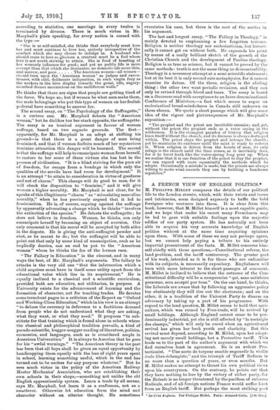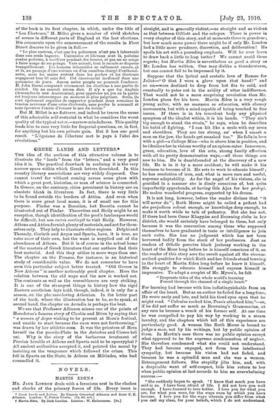A FRENCH VIEW OF ENGLISH POLITICS.* M. PHILIPPE MILLET compares
the details of our political life to the London streets, which, with their twists and turns and intricacies, seem designed expressly to baffle the bold foreigner who ventures into them. It is clear from this book, however, that M. Millet himself is a most capable guide, and we hope that under his escort many Frenchmen may be led to gaze with suitable feelings upon the majestic edifice of our party system. He has naturally not been able to acquire his very accurate knowledge of English politics without at the same time acquiring opinions upon them. With some of these we may not perhaps agree, but we cannot help paying a tribute to his entirely impartial presentment of the facts. M. Millet concerns him- self chiefly with three questions,—Constitutional reform, the land problem, and the tariff controversy. The greater part of his work, intended as it is for those who are unfamiliar with its subjects, is necessarily expository. Englishmen will turn with more interest to the short passages of comment. M. Millet is inclined to believe that the outcome of the Con- stitutional difficulty will be a compromise " qui, sans satisfaire personne, sera accepte par tons." On the one hand, he thinks, the Liberals are aware that by following an aggressive policy too obstinately they will tire out the electorate ; and on the other•, it is a tradition of the Unionist Party to disarm an adversary by taking up a part of his programme. With regard to the land question, M. Millet seems to hold that agri- culture, which was ruined by Free-trade, will be revived by small holdings. Although England cannot cease to be pre- dominantly industrial, yet she is still affected by "la nostalgic des champs," which will only be cured when an agricultural revival has given her back youth and elasticity. But this revival must depend, according to M. Millet, upon her adopt- ing not merely small holdings, but a Protective tariff. This leads us to the part of the author's argument with which we find ourselves least in agreement. He is an ardent Pro- tectionist. " Une sorbs de torpeur semble engourdir la vieille ecole libre-échangiste," and the triumph of Tariff Reform is no more than a question of years, or even months. But M. Millet makes no attempt to thrust his own political views upon his countrymen. On the contrary, he points out that they have nothing to lose by the victory of either party, for the Entente is no longer• threatened by the pacifism of extreme Radicals, and of all foreign nations France would suffer least from an English tariff. But perhaps the most striking part
La Criss Anglaise. Par Philippe Millet. Paris : Armand Colin. [3 Ir. 50e.]
of the book is its first chapter, in which, under the title of "Les Electeurs," M. Millet gives a number of vivid sketches of scenes in different parts of England at the last elections. His comments upon the announcement of the results in Fleet Street deserve to be given in full :—
" Le plus curieux, c'est quo les policemen n'ont pm a intervenir dans une Beide bagarre. Unionistes et liberaux sent la, poitrine centre poitrine, a vociferer pendant des heures, et pas on ne songe a faire usage de ses points. Vers minuit, tout le monde se disperse tranquillement. Les hourras inlassables se ralhunent encore, cit et la, an passage d'une voiture ou d'un omnibus charge d'enthousi- sates, mais les mains restent dans les poches et lea electeurs regagnent lour lit sans fiel. Cet enervement inoffensif dare une quinzaine de jours. Aucun autre peuple no pourrait l'endurer. M. John Burns comparait recemment les elections a une partie do cricket. On ne saurait mieux dire. 11 n'y a que les Anglais (demandez-le aux Americains), pour apprecier un jen oa la partie est toujours interrompuo an moment le plus palpitant. Seuls, ils sont egalement capables de supporter pendant deux semaines la tension nerveuse d'une crise electorale, sans perdre le sommeil et sans eprouver l'envie d'ecraser le nez du voisin."
But M. Millet is no flatterer, and indeed he traces the cause of this admirable self-restraint in what be considers the worst quality of the typical voter,—narrow-mindedness. This quality leads him to care very little for Imperial questions, or, in fact, for anything but his own private gain. But it has one good result. " L'egoisme de l'electeur met le pays a l'abri des re volutions."







































 Previous page
Previous page